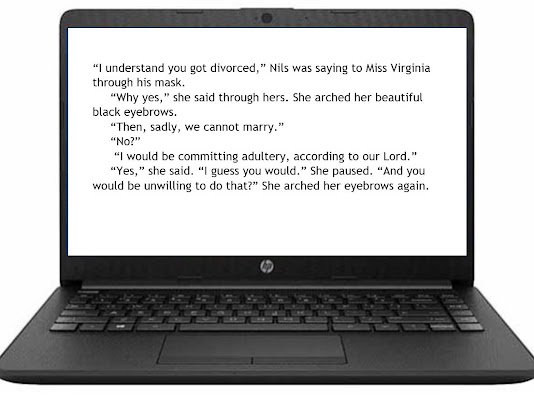Lost Cause
Nils was saying to Miss Virginia.
“What are you writing,” Roz said,
looking over my shoulder.
I gestured at the screen. “I was
going to add,” I said, “‘For me? You wouldn’t do that ... for me?’ Is that too
much?”
“Yes.” she said. “It is. Besides, None of it is remotely true.”
“Well,” I said. Not “Well, ...” as
if I were going to go on from there. I just said, “Well.” (period)
“It’s a lie,” Roz said. “As far as you
know, Nils and your stunning rector have never
met.”
“All writing is a lie,” I say
(present tense because I am always saying this). “As soon as you put the third
word behind the second, you have departed from the truth.”
“‘Departed from the truth,’” she
said. “What a mouthful. Look at me.” And she shook her head.
I am in sitting in Uncle Albert’s
chair. Roz is standing behind me. “I wasn’t going to put it up,” I say, looking
at her. “I wasn’t going to publish it,” looking away. She leans over and puts her cheek on top
of my head; she rests it there for several seconds. She smells like herself, wonderful. She stands up again.
“You really don’t like Nils!”
she said. “Do you?”
“I try to,” I say. “Besides, you don’t
really like him either.”
“He’s not my favorite human being,
but I don’t dislike him. I think you do. Why?”
“I was reading an op-ed in the Times today. It was about ‘woke’,”
I said. “It said something like ‘you don’t like “woke” — you’ve made the word
the butt of bad jokes — because you want to stay asleep.’ You meaning we
troglodytes that still read Scripture instead of the Times as
Scripture.”
“Hmmm,” Roz said.
 |
Margaret Mitchell and Ernest Dowson
Hollywood, 1939
|
“I wanted comment on it, put up a comment on the article, that, actually,
we poor, deluded, sleeping, drowning in our Gone with the Wind dreams don’t
dislike ‘woke’ if it means ‘awakened’ but it’s become a synonym for ‘arrogant.’ And we
didn’t make it that.”
“Gone with the Wind,” Roz said. “I read somewhere that it’s a
line from a poem. Did you know that?”
“Yes, by Dowson,” I said, and I put
down the laptop and went off to find it because I couldn’t remember which poem.
“Yes, you would,” Roz said after me.
“Just the kind of think you'd know. You don’t have to find the book, you know,” she called. She meant I
could have googled it. But I was already on the stairs.
It was, I thought, in the one, the poem, with the
refrain
I
have been true to thee, Cynara
In my fashion.
But I couldn’t remember which
one that was, one of those with a long title in Latin.*
_______________
I had a letter a few days ago from my sister Moira. She writes a lot about how little people truly understand each
other, even when we want to, even when we are desperate to do so.
There
are things, you know, that you both understand and don’t understand at the same
time. You feel them achingly clear, but you can’t explain them. No matter how
much you want to. You don’t have the language for it, however good a writer or
talker you are.
It’s as if you and I met for a day – we weren’t
brother and sister, and we didn’t know each other. It’s as if we fell in love that
day, but you spoke Hungarian and I spoke French, and we didn’t speak any other
languages. And the day came to an end, and we were going to meet the next day,
but we didn’t. Then, what we “knew” would be like that, feelings that we
understood in some part of us, but neither of us could explain. What we knew about
each other especially: We’d know it, but we couldn’t say it.
This isn’t true for the woke. They don’t
have to speak your language to understand you. They don’t even have to have met
you to know what you’ve been thinking, you simple-minded shit. What does it
matter, you’re not going to get with the program anyway? Forget it. You’re a
lost cause.
11.17.21
_______________
* You can read the poem, “Non sum qualis eram
bonae sub regno Cynarae,” and
listen to it here. It was the first of several episodes of “Love in the Time of
Cholera,” another of my great ideas undone by my greater inability to keep at
anything.
The graphic is by mel ball.







